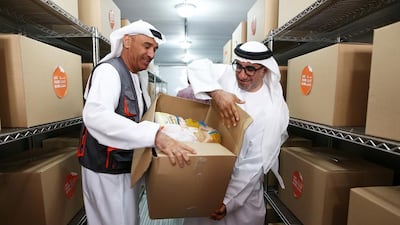Dubai Municipality is launching a major drive to tackle food waste.
Along with the UAE Food Bank, it is calling for "zero tolerance" towards food waste from consumers and the food industry.
The move is part of a series of initiatives from the municipality on World Food Day, which falls on October 16, and includes food donation drives, competitions and a social media campaign with the hashtag #ZeroFoodWaste.
For example, the "Fill up the fridges" campaign will encourage people to donate packaged food to Food Bank fridges that will be placed across the city. Food companies and restaurants will be encouraged to submit ideas on how to tackle food waste to the foodsafetydubai.com website. And members of the public are asked to share their ideas on social media using the #ZeroFoodWaste hashtag.
"We as individuals, as well as government and the food business have to commit ourselves to reducing food waste in Dubai and the UAE," said Khalid Mohammed Sharif, assistant director general of Dubai Municipality for Environment, Health and Safety Control Sector.
Food waste is a problem affecting countries and governments across the world. According to the United Nations, a third of the food produced for human consumption every year — about 1.3 billion tonnes — gets lost or wasted. Fruits and vegetables, plus roots and tubers have the highest wastage rates of any food.
Closer to home, a Masdar study published this year found that almost half of food in UAE hotel buffets is wasted, while the Dubai Media Office has reported that the UAE loses Dh13 billion a year in food waste.
To combat this, the UAE Food Bank was launched in April to allow hotels and companies to donate food to low-income families and labourers.
Now Dubai Municipality's move to call for zero tolerance is the latest to tackle the issue.
_________________
Read More:
Change of mindset needed to tackle UAE’s food waste issue, expert says
Abu Dhabi heralds waste-reduction success
Masdar study: almost half of food in UAE hotel buffets is wasted - graphic
_________________
There is a federal target of reducing food waste by three quarters before 2021.
Initiatives to curb food waste are being implemented across the country. Their success relies on changing consumer habits at home and at the supermarket.
The Ras Al Khaimah government launched its recycling campaign in Al Rams and southern communities last month, asking residents to separate food waste into brown bags. It is the first step in the emirate’s plans to compost all clean food waste, which accounts for a third of RAK’s rubbish.
Official figures from 2014 indicate that food waste made up half of Dubai’s rubbish.
Once discarded food ends up in a landfill, it releases methane gas as it decomposes. These landfill emissions are a large green house gases that contribute to climate change. It’s estimated that global food waste food releases the green house gas equivalent to 3.3 billion tonnes of carbon dioxide every year.


